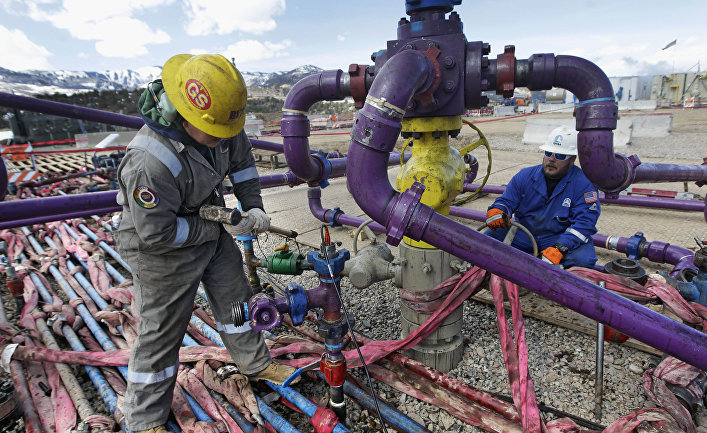The American oil lobby agreed to lift the ban on oil exports, which was in force for 40 years. Among others, the winning argument was the necessity to confront Russia, which uses energy as a tool for foreign policy.
Compromise, American style
Last Friday, December 18, the US Senate finally approved the budget for 2016 fiscal year. As usual, the budget was delayed for two and a half months this time (a new fiscal year in US starts on October 1). The oil lobby has managed to include a provision to lift the ban on US oil exports that had lasted for 40 years.
At first, House Minority Leader Nancy Pelosi, had opposed the draft budget just because of the oil companies proposal, but eventually she had supported the final document. 166 fellow Democrats followed her lead, and only 18 were against the bill. While commenting on her decision, Pelosi said: "Republicans wanted big oil so much that they had to abandon all other initiatives." This entails the Republican attempts to block funding for Planned Parenthood (public organization that provides health services to women, including abortion), as well as to restrict the flow of Syrian refugees, to block Obama's environmental protection initiatives, regulation of financial institutions, and improvement of US-Cuba relations. Meeting the Grand Old Party halfway on the embargo issue, Democrats were able to increase spending on social programs, tax deductions for working families, and tax benefits for solar and wind energy. Why do Americans need export.
The US' decision to lift its ban on oil exports will have little impact on its energy security or export volumes. https://t.co/JpyXZZiald
— Stratfor (@Stratfor) December 19, 2015
Since 2008, US oil production has grown by over 50% because of Texas and North Dakota deposits, producing light sweet oil. However, most US refineries are focused on hard and middle oil, as a result the light oil producers are being faced with overproduction. Two years ago they developed a violent lobbying activity to get the rights to sell their production abroad, where refineries can process it. This is not to say that all oil companies were united. The oil producers were for it, while the refineries were against the initiative, since they already have the right to export their products and earn extra income from low commodity prices.
Powerful lobby
Just five months ago, it seemed like too many analysts believed that the lift of the ban will not happen while Barack Obama is in office. But several factors have been underestimated.

First, the idea didn't receive serious opposition from the environmentalists, as it was in the case of Keystone pipeline, construction of which was vetoed by Obama. Second, both houses of Congress are now controlled by Republicans favorable to the energy industry. Third, Democrats' ability to compromise with the Grand Old Party, having bargained various concessions. Fourth, the sophistication of the US oilmen in the Congress procedural nuances, namely the inclusion of provisions on the lifting of the oil exports ban into the federal budget law, which must be taken at all accounts.
Finally, amid the US-Russia standoff, the oil lobbyists idea of the necessity to lift the embargo to resist Russian expansionist foreign policy worked out. Another strong US fuel and energy industry proof point was the gradual lift of sanctions against Iran. A reasonable question is — why Iran is allowed to export oil, but not the US.
Oil prices plummet to 11-yr low as US lifts export ban https://t.co/jZMh6hPaPn pic.twitter.com/hEte4xyVmS
— RT (@RT_com) December 21, 2015
It is a largely symbolic decision. The US remains a net oil importer due to the large volume of domestic consumption. It's unlikely that the Senate's decision will have any impact on oil prices. Price quotations are pushing down the actual collapse of the OPEC (the organization was not able to control the volume of oil production of its members), as well as the prospects of Iran returning to the global oil and gas markets.






